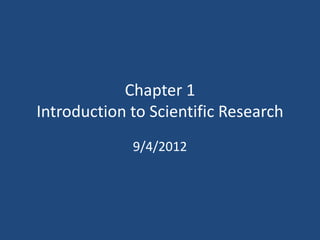
Chapter 1 class version(2)
- 1. Chapter 1 Introduction to Scientific Research 9/4/2012
- 2. Roadmap • Taking a course in research methods is like _______ . • Course roster verification • Blackboard: Keep checking for materials – PPT slides • Chapter 1
- 3. Introduction to Scientific Research • What is Science? • What is scientific research? • What are the goals of scientific research? • What are the assumptions of scientific research? • What is the role of the researcher and theory? • What is Pseudoscience and how do we recognize it?
- 4. How do we Acquire Knowledge? • Multiple ways to acquire knowledge
- 5. Knowledge Acquisition • Intuition: a way to acquire knowledge not based on reasoning or inferring • Authority: accepting information as fact because it comes from a highly respected source
- 6. Knowledge Acquisition • Rationalism- acquire knowledge through reasoning • Empiricism- acquisition of knowledge through experience
- 7. Science • A way of acquiring information that is designed to systematically produce reliable and valid information about the world • Different “scientific methods” throughout history
- 8. • So what is science and how do we do it? • First, understand the basic assumptions underlying scientific research.
- 9. Basic Assumptions Underlying Scientific Research • Uniformity/Regularity in Nature • Determinism- the belief that there are causes of behavior and mental processes.
- 10. Basic assumptions cont. • Reality in Nature • Discoverability – Assumption that it is possible to discover the uniformities that exist in nature.
- 11. Characteristics of Scientific Research • We rely on these to produce reliable knowledge: • Control • Operationalism • Replication
- 12. Control • Control refers to eliminating any extraneous variables that could affect observations. • Impacts ability to draw causal inferences
- 13. Operationalism • In science we must be specific with regard to what we are talking about. • An operational definition is the definition of a concept by the operations or measures used to measure them. – Example: Anxiety
- 14. Replication • Ability to reproduce the findings from another study. • If the findings are “real” then I should be able to replicate someone else’s study. – What might affect this? • What if we can’t replicate results?
- 15. Replication, cont. • Problem: the importance of replication in science ≠ commitment to carrying out replication studies • Meta-analysis: Quantitative technique for describing the relationship between variables across multiple research studies.
- 16. Goals of Scientific Research • Ultimately, science seeks to understand the world around us. • Description • Explanation • Prediction • Control
- 17. Description • Typically where science starts. • Describe the phenomenon.
- 18. Explanation • Determine WHY something happens – Identify antecedent conditions • Most things are not caused by only one factor but rather multiple factors.
- 19. Prediction • After we know what something is and why it occurs, we want to be able to predict it. • Prediction is the ability to anticipate the occurrence of an event before it occurs.
- 20. Control • Control in this case refers to the manipulation of antecedent conditions to produce a change in outcome. *Note: multiple uses of the word “control” – See p. 22 in text for discussion
- 21. Role of Theory in Scientific Research Observations from studies Formulate Theory Generate testable hypotheses using the theory Prediction false Prediction True Theory is inaccurate Theory is useful in explaining phenomenon
- 22. Role of the Scientist (read in text) • Curiosity – “Serendipity- the art of finding one thing while looking for another” (Skinner, 1956) – “Chance favors the prepared mind” (Pasteur, 1854) • Patience • Objectivity • Change
- 23. Pseudoscience • Pseudoscience is an approach that claims to be scientific but is not based on scientific methods • Based on methods and practices that violate many tenets of science
- 24. Ways to identify Pseudoscience • Creating new (ad hoc) hypotheses to explain away negative findings • Emphasis on Confirmation rather than Refutation- reinterpret negative findings as support.
- 25. Ways to identify Pseudoscience • Absence of Self- Correction • Reversed Burden of Proof • Overreliance on Testimonials and Anecdotal Evidence
- 26. Ways to identify Pseudoscience • Use of Obscure language to make a claim sound like it has survived scientific scrutiny • Absence of a connection with other disciplines that study related issues
- 27. Suggestion: To help you get in the psychological scientist mindframe, check out: www.psychologicalscience.org APS on facebook Follow PsychScience on Twitter
- 28. Questions?